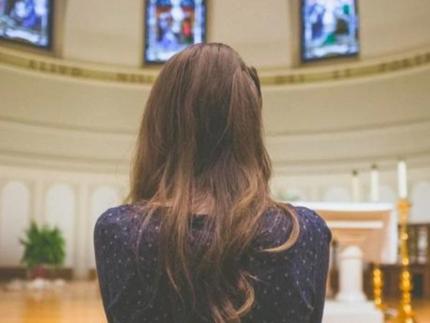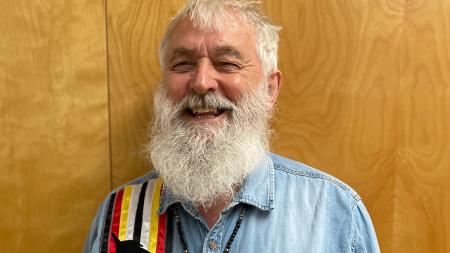Thrive Disability Training Promotes Belonging

A Thrive training on Oct. 11 focused on nurturing belonging for all people in and around faith communities. Nurturing Belonging: Exploring Hospitality, Disability, and Theology was hosted by Thrive (a ministry of the CRCNA) and by Disability Concerns of the Reformed Church in America (RCA).
From across the U.S. and Canada, and as far away as Nicaragua, Kenya, and Ireland, 82 participants gathered online representing 47 congregations of the CRCNA, the RCA, and other denominations.
For four and a half hours throughout the afternoon of Oct. 11, participants heard from speakers on topics such as biblical narratives and disability, ableism’s impact on hospitality, and practical steps churches can take to nurture belonging for all people.
To nurture belonging in the event itself, interpreters translated the speakers’ words into American Sign Language and Korean, and closed captioning was available for other languages.
“We modeled accessibility in every way we know how. We shared visual descriptions of ourselves, said our names prior to speaking, offered multiple ways to ask questions, etc.,” said Thrive disability consultant Lindsay Wieland Capel.
Capel and RCA Disability Concerns director Jeremy Simpson welcomed participants and explained the goals and event logistics before inviting the first speaker to begin.
Dr. Carlos Thompson, assistant professor of Christian ministry and disability theology at Western Theological Seminary, began by exploring the biblical view of the person, health, and shalom. The concept of shalom is far-reaching, he noted, touching all aspects of creation, and is a picture of wholeness in oneself, one’s family, and one’s community. Thompson also serves Western as director of the Friendship House Community, director of the Friendship House Fellows Program, and student accessibility coordinator. With a scholarly background in religious studies and practical theology, and with lived experience with congenital cerebral palsy, Thompson brought a helpful perspective to the training.
Focusing on three stories from the gospels – featuring the woman with the issue of blood, the man on the mat lowered through the roof, and the man born blind – Thompson pointed out that the physical healing of these persons was secondary to their restoration to the community and to a new task of sharing the good news about Jesus.
“When we start preaching and teaching that physical healing is all there is in ‘healing,’ we miss the point,” said Thompson. “Real healing is restoration to shalom.”
Thompson suggested that God created us for relational connection with himself and with each other. “That’s how we can engage with people where they’re at and invite people into communities of people with needs . . . who are loved by God,” he said. People with needs “should be welcomed into communities under the name of God to find their place in him.”
During a question and answer time after Thompson’s presentation, the sometimes-pejorative language in the Bible concerning disabilities came up. Thompson encouraged people to take language of that sort in context. When we come across pejorative references, he said, we shouldn’t throw out the Bible or rip out the pages. Instead, he said, we should turn to Jesus and see such references through his life and through his loving interactions with people living with disabilities.
When Jesus chose to heal, said Thompson, he brought full restoration, showing that he is God. For example, when Jesus takes mud and puts it on the eyes of a man born blind, said Thompson, “it’s like he’s making eyes and putting them into the man’s face. He is inviting people to recognize that Jesus is the same God making humanity from clay as in the creation story.”
Dr. Ben Conner, professor of practical theology and director of the Center for Disability and Ministry at Western Theological Seminary, led the next session. Conner has written several books on disability theology and witness.
Some examples of ableism that persist in church buildings, said Conner, are steep steps, heavy doors, slide shows without image descriptions, speaking too quickly or too quietly for people to follow, and filtering out people who are “different.”
Conner presented a series of images that show hospitality as a Christian practice: first, Eden, the place of God’s hospitality; then Adam and Eve being sent out of Eden, representing our rejection of God’s hospitality, bringing pragmatism, competition, and manipulation into our versions of hospitality. Other imagery helped participants to reflect on different views of hospitality: providing safe spaces to pilgrims as a service to God; having the grace to accept hospitality; communion as participating together in hospitality and as a vision for the future banquet; and the future banquet itself, where God will have removed all barriers between us and him, and between us as his people.
In many churches and communities, suggested Conner, people with disabilities are typically envisioned as guests rather than hosts. “Ableism suggests that in order to participate in the practice of hospitality as a host, one must possess particular abilities and competencies,” he noted.
Hospitality can be considered more of a way of life, an orientation, than an act, said Conner. If we seek ways to include the “other” rather than only using hospitality to strengthen existing bonds, we can widen our hospitality to include people who need companionship, recognition, and care, including people out of sight in prisons, extended-care facilities, and special-ed classrooms, he said.
Jesus was marginalized, yet he was in the center of God’s will. We can resist marginalizing people by really seeing them, welcoming people into our lives, celebrating every person’s gifts. “We need to move beyond programs for people with disabilities,” said Conner. “Rather, we need to invite people as they are and invite them to share their gifts and all be changed.”
During a question and answer period, one participant, Elly, shared how she had offered a gift without realizing it, when she asked another customer in a grocery store for help reaching a product. The woman asked her if she often needed to ask for help, and if that bothered her. Elly told her that she did often need to ask for help, but it didn’t bother her, and that many people are happy to help. The woman thanked Elly for asking her for help, and let her know that because of her example, she hoped she herself would be more comfortable asking for help when she needed it.
Victoria White, program director for With Ministries and a student in the master in disability studies in education program at Calvin University, presented a three-part plan for ministry and inclusive worship, offering practical ideas for participants to take to their home congregations.
Perspective, she said, helps us to realize that everyone has things they can offer and that everyone has areas in which they need what others can offer. “Everyone is good at something. No one is good at nothing. Everyone has gifts they bring to the world and their community; everyone needs help with something and needs support,” White suggested. Where those needs meet, she said, is where God wants us to be. Remembering this can help us to see how we can walk together in community.
Changing how we talk can help us remember these shared gifts and needs, she added. For example, White noted that person-first language is her default, but she honors identity-first language for people who prefer that. She encouraged participants to speak of ministry with, rather than for or to, and to focus on what people can do. When people belong, they are missed when they’re gone; they are known and appreciated.
White also encouraged participation through universal design, noting several inventions in common use now that were originally designed to accommodate disabilities, such as “Push to Open” buttons on doors, elevators, and garage-door openers. Universal design can include more than just building access, she said – for example, snacks that accommodate allergies and sensitivities, worship styles, and options such as ribbons or flags, sign language, and images.
Finally, White invited participants to think of ways to personalize our hospitality, responding to individual needs and creating plans for support. Intake forms can help to identify gifts and areas of support. Websites can help people anticipate the environment of a church and what to expect. Wrap-around teams can create interdependent community support to ensure that people can both serve and find support.
During a panel discussion, Mike, Josh, Cassie, and Wade – persons who live with disabilities as members of Christian communities – offered some insights. The panelists discussed coming to terms with disability, stewarding disability well, finding health and strength in community, disability theology, barriers to hospitality (such as attitude, physical structures, and communications gaps), and how to become more informed about disabilities. They shared stories from their own experiences of times when churches did really well in nurturing belonging, and times when churches were unhelpful or even hurtful. The panelists also suggested ways in which everyone can learn to build community together.
“With about 20 percent of people living with disabilities, there are people with disabilities in every church. This isn't a niche topic for a few passionate people,” said Capel. “Eventually every pastor will preach a sermon related to disability, and they need to understand the difference between curing and healing, or their words can be harmful. At some point every youth director or Sunday school teacher will have a kid with a disability in the room (whether they can tell or not), and we'd like them to have the tools to help that child experience belonging. That's what this training was all about.”
A recording of the event will be available sometime this fall, said Capel. She added that a good way to find out when the recording becomes available would be to sign up to receive the Breaking Barriers newsletter at crcna.org/disability.


